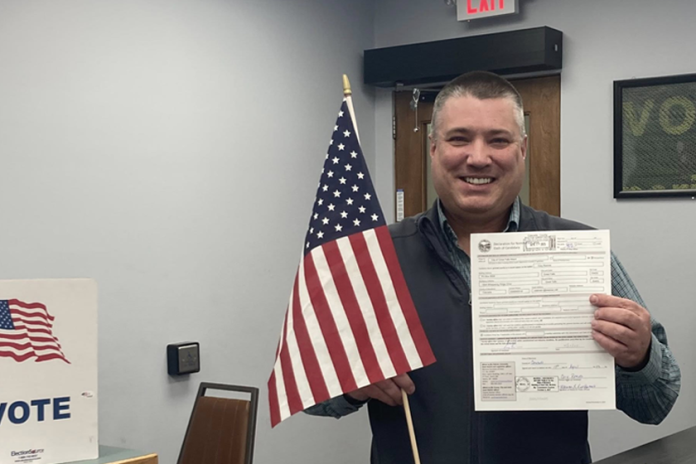Cory Reeves, the current mayor of Great Falls, is running for re-election in the upcoming 2025 municipal election.
He officially filed for re-election, and his challenger is Jasmine Taylor.
Reeves has served as mayor since 2024 and is completing his first two-year term, set to end December 31, 2025. The filing period for the mayoral election closed on June 11, 2025, confirming his candidacy.
The election will be held in November 2025, and all newly elected officials will take office in January 2026.
Before becoming Mayor, Cory held the role of Executive Director at Adlera Laboratory LLC from July 2022 to November 2023.
Cory also served as Undersheriff at the Cascade County Sheriff/Coroner’s Office from January 2019 to July 2022 and had a long tenure at the Great Falls Police Department from March 1998 to December 2018, where Cory worked as a Police Officer and Detective.
Cory Reeves holds a Bachelor of Science degree from the University of Providence.
Cory Reeves’ main priorities as he continues to serve as mayor of Great Falls are:
-
- Reducing red tape and improving city processes: He has made significant efforts to streamline the city’s zoning and permitting processes, aiming to make it easier for businesses and developers to invest in Great Falls. Reeves prioritizes cutting bureaucratic obstacles and making city government more supportive of local entrepreneurship and economic growth.
- Transparency and community engagement: Increasing transparency and communicating openly with residents and stakeholders are core themes for Reeves. He believes in actively updating the public and keeping city government accessible and accountable.
- Economic development: Reeves is optimistic about new growth and is focused on ensuring the city’s infrastructure—such as roads and utilities—can support expanding businesses. He sees economic momentum as a key opportunity for the city’s future.
- Addressing housing needs: With population growth, Reeves acknowledges the need for more diverse and affordable housing options. He is working to remove obstacles in the permitting process and collaborating with developers to expand housing availability across income levels.
- Cost of living: In recent city communications, Reeves also named the cost of living as a top priority alongside public safety, indicating ongoing efforts to make Great Falls an affordable place to live.
Reeves combines a focus on essential city services—like safety and infrastructure—with goals to foster growth, transparency, and livability for all residents of Great Falls.
Cory Reeves’ law enforcement experience significantly shapes his vision for community growth by emphasizing the principles of community policing, partnership, and trust-building with residents.
Drawing from practices common in effective law enforcement leadership, Reeves approaches public safety not just as crime prevention, but as an essential foundation for stable, thriving neighborhoods and economic development.
Key Points
Partnerships with the community
Law enforcement experience often highlights that crime prevention and community well-being are more successful through collaboration between police and residents. Reeves likely values building networks among city agencies, businesses, and citizens to jointly address issues and foster an environment attractive for growth.
Empowerment and engagement
Community policing teaches that officers and city leaders should be empowered to address local needs creatively and directly. Reeves’ background would inform his approach to encourage city officials and residents to take initiative in problem-solving partnerships that strengthen community bonds.
Holistic public safety
Officers with broad law enforcement experience recognize that addressing social drivers of crime (such as housing insecurity, youth engagement, and economic opportunity) is critical. Reeves integrates these lessons, prioritizing public safety improvements as a prerequisite for investment, business confidence, and population growth.
Trust and transparency
Law enforcement leaders learn the importance of community trust and open communication for effective policing. Reeves carries this forward by promoting transparency in government and ongoing dialogue with residents, aiming to create a secure and welcoming atmosphere that fuels community growth.
Integrated service delivery
Modern policing often involves working across government departments—housing, health, social services—to address quality-of-life issues that affect safety and growth. Reeves’ vision for Great Falls is likely grounded in this collaborative, cross-sector approach.
Reeves’ law enforcement background leads him to see public safety as inseparable from economic vitality and livability, and he prioritizes strategies that empower community members as partners in building a safe, dynamic city.
Reeves aims to address the cost of living for Great Falls residents through several interrelated strategies centered on essential city services, economic opportunity, and housing:
Expanding affordable housing
Reeves prioritizes removing obstacles in the city’s permitting process, collaborating with developers, and encouraging diverse housing options. This approach is intended to make housing more accessible and keep prices manageable for residents as population growth increases demand.
Streamlining city processes
By reducing red tape, Reeves believes local businesses and housing projects can move forward faster, potentially increasing housing supply and business competition—both factors that can influence cost of living.
Public safety and essential infrastructure
By ensuring the city’s safety services and core infrastructure are well-supported, Reeves aims to foster a stable environment for investment and job creation, indirectly addressing cost of living by supporting wage growth and protecting property values.
Transparency and accountability
Reeves emphasizes clear communication with residents regarding costs, taxes, and community investment, aiming to keep local government effective and spending focused on priorities that benefit everyday life.
While Reeves does not propose direct financial assistance or subsidies to offset living expenses, his strategies are focused on long-term factors — especially housing and local economic development that strongly influence what residents pay for everyday needs.
These efforts are meant to increase housing availability, reduce barriers for local businesses, and maintain Great Falls as an affordable place to live through economic growth and efficient local governance.
More Info
For more information, you can visit Cory Reeves on his Facebook page or contact the Cascade County Election Office (406-454-6803, elections@cascadecountymt.gov).






